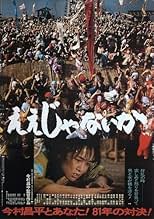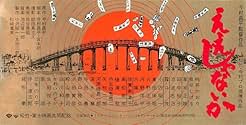Aggiungi una trama nella tua linguaNear the turbulent end of the Edo era, a man returning to Japan after exile in America searches for his wife and becomes swept up in the current of revolution in this incisive period drama f... Leggi tuttoNear the turbulent end of the Edo era, a man returning to Japan after exile in America searches for his wife and becomes swept up in the current of revolution in this incisive period drama from the great Shohei Imamura.Near the turbulent end of the Edo era, a man returning to Japan after exile in America searches for his wife and becomes swept up in the current of revolution in this incisive period drama from the great Shohei Imamura.
- Regia
- Sceneggiatura
- Star
- Premi
- 6 vittorie e 7 candidature totali
Recensioni in evidenza
It's 1866. Genji returns to Japan after six years in America. He's told that his wife had been sold. It's the turbulent end of the Edo era but filmmaker Shôhei Imamura follows the lowly common man.
I am interested in Genji and Ine. I like this lower class Japan. It's not something that I've seen before. The story is somewhat chaotic. There is a lot going on. I would like to have less. I do like the crass ugliness and its beauty. This has good energy.
I am interested in Genji and Ine. I like this lower class Japan. It's not something that I've seen before. The story is somewhat chaotic. There is a lot going on. I would like to have less. I do like the crass ugliness and its beauty. This has good energy.
Shohei Imamura's "Eijanaika" is an awesome film -- much better than I expected. This is a film painted on a much bigger canvas than Imamura's norm -- it's rather reminiscent of Dickens's "Barnaby Rudge", albeit with humor, nudity and sex. It is set in the turbulent last days of the Shogunate, and has a large number of characters one must try to keep track of -- something I didn't find that hard to do. Whatever it lacks in "subtlety", it makes up for in exuberance.
Japanese Films are great i have seen films from Akira Kurosawa, Yaziro Ozo, Takeshi Kitano, Shunji Iwai, and Takashi Miike these were great directors, which were in my book, which also includes Shohei Imamura's "Eijanaika" is an excellent film this film portrays the Yokohoma in one age The Prostitutes, The Samurais also portrays 2 Lovers nice film overall this was the first film i have seen by Mr. Imamura and i have absolutely enjoyed it not to mention it was greatly shot by the director the beauty of the scenery the fireworks the streets the flowers the people all beautifully shot 10101010 for this good film and to look back at the history it was extraordinary experience, excellent film well as good experience at first glimpse of works of Mr. Imamura.
This busy, hectic movie is a bit hard to follow. Like a Mardi Gras film, with political confrontation, and wild swirling colors. But not as subtle or as personal as Nianchan (My Second Brother), Unagi (The Eel) or Narayama bushiko (The Ballad of Narayama) by Shohei Imamura.
Shigeru Izumiya returns from shipwreck and a sojourn in America to Japan in the chaos of the Meiji Restoration. He escapes from prison, searches out his wife, Kaori Momoi, who had been sold by her parents to the perpetual carnival outside of Tokyo. They struggle to reconnect, and eventually gain a tentative foothold, only to see it vanish in the last thrashings of the Shogunate.
Shôhei Imamura had taken a decade off from narrative movies to direct documentaries. He had returned to fiction in 1979, but his focus was still on the underclass, and the chaos they live amidst. As his leads struggle and fall, and cease to care, Imamura's focus is on their futile efforts to find some happiness, and the uncaring brutality of their rulers. It's a long journey from Kurosawa's noble samurai and traditional Japanese insistence on dedication to the nation to this frequently shocking movie, but the director's focus and viewpoint are compelling.
Shôhei Imamura had taken a decade off from narrative movies to direct documentaries. He had returned to fiction in 1979, but his focus was still on the underclass, and the chaos they live amidst. As his leads struggle and fall, and cease to care, Imamura's focus is on their futile efforts to find some happiness, and the uncaring brutality of their rulers. It's a long journey from Kurosawa's noble samurai and traditional Japanese insistence on dedication to the nation to this frequently shocking movie, but the director's focus and viewpoint are compelling.
Lo sapevi?
- ConnessioniFeatured in Cinéma, de notre temps: Shohei Imamura, le libre penseur (1995)
I più visti
Accedi per valutare e creare un elenco di titoli salvati per ottenere consigli personalizzati
Dettagli
Contribuisci a questa pagina
Suggerisci una modifica o aggiungi i contenuti mancanti





















